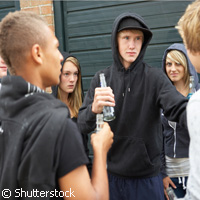Alcohol and violence in the media - what does your child think?
Researchers from the United Kingdom and Sweden are taking part in a unique EU-funded project analysing fictional media representations of alcohol and alcohol-related violence; the aim is to understand youth drinking culture. The project, titled 'Alcopop Tv Culture' is funded as part of the European Commission's Daphne III programme, whose main aim is to prevent and put an end to violence, especially of a physical, sexual or psychological nature, against children, young people and women. Now in its third phase, covering the period from 2007 to 2013, the Daphne programmes also aim to protect victims and groups at risk; their sights are set on attaining a high level of physical and mental health protection, well-being and social cohesion throughout the entire European Union. The Alcopop Tv Culture research team are looking at how society and other actors should react to the link between young people's media habits and their alcohol consumption. The team want to put young people themselves at the centre of this discussion by giving them a voice in the issues that affect them directly. In their research, they will study the relationship between the media habits of young people between the ages of 10 and 25, and alcohol consumption. One of the project coordinators, Christian Munthe from the University of Gothenburg in Sweden, says: 'There is a well-documented link between watching programmes that show alcohol, such as TV reality shows, and increased drinking. But there isn't much research on what to do about it.' The researchers will meet young people in schools to hear what they have to say about alcohol information campaigns, and the link between their media habits and alcohol consumption. 'It is pretty clear that adolescents often feel a bit belittled, for example, by societal campaigns and organisations that come to talk to them about alcohol. This is one reason why we have a Facebook and a Twitter page full of new research reports, news and debates,' comments Christian Munthe. 'We hope that the adolescents will use the pages both to gain information and to share their opinions.' The project is also examining how the burden of responsibility for increased adolescent drinking is shared among different actors such as state authorities, media companies, companies in the alcohol industry, families and young people themselves. Christian Munthe comments: 'Our hypothesis is that the responsibility should be shared. The media companies have a major moral responsibility, but it is up to the government to decide on the accessibility of alcohol. Families and the adolescents themselves also have a certain responsibility.' The ultimate goal of the project is to come up with a draft policy roadmap on how to allocate shared responsibility. However, the team are up against the growth and expansion of the global media landscape via the Internet and social media as well as through the gaming industry. In this new context, it is increasingly difficult to advise on the use of tools such as censorship, age limits and airtime regulations, as they are more and more difficult to implement. Column inches across Europe are often filled with tales of night-time debauchery and the apparent decline of young people's moral values when it comes to drinking. Via their Facebook page, the Alcopop Tv Culture team aim to sieve through this coverage, and flag up relevant media reports to initiate discussions about how alcohol and young people themselves are represented. The team can then explore what impact these narratives and discourses have on young people and their habits. In turn, this will hopefully lead to the formation of policy recommendations that stem from youth culture itself, rather than from meeting rooms and corridors far from the real pressures and realities young people face when it comes to alcohol and violence.For more information, please visit:University of Gothenburg:http://www.gu.se/english
Countries
Sweden, United Kingdom



